Suceava: Gearing up for Electro-mobility through URBACT
Edited on
25 February 2015Electric vehicles appear today as a way forward to reduce tailpipe carbon emissions and noise pollution, as well as a promising source for economic development.
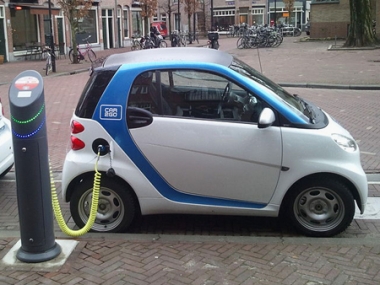
Electromobility features prominently in the Green Car Initiative (GCI) included in the European Economic Recovery Plan as well as in the European 2020 strategy aimed at making the EU a smart, green and sustainable economy by 2020. However limited infrastructure, higher initial purchase-prices and outdated legislation concur in making Europeans still reluctant about embracing electric vehicles (EVs). More than ever, there is a need for technology, policy-makers and society to dialogue. Suceava, a middle-sized Romanian city at the external border of the Union, took an important leap forward in electromobility through the URBACT programme. As partner of the EVUE network, focused on developing integrated and sustainable leadership for cities to promote the use of electric vehicles. Through URBACT, Suceava has become a pioneer in this policy area in Romania. EVUE - Electric Vehicles in Urban Europe
- Focus: fostering the development of integrated, sustainable strategies and dynamic leadership for cities to promote the use of electric vehicles (EV). Urban initiatives to encourage the public and business to use EVs will contribute to EU clean air and car fleets targets, making cities more attractive and competitive. EVUE partners shared and disseminated solutions to key barriers such as public resistance, lack of infrastructure, rapid technology change and obsolete economic modelling.
- Partners: Westminster (UK) acting as Lead partner, Beja (PT), Katowice (PL), Frankfurt (DE), LIsbon (PT), Madrid (ES). Oslo (NO), Stockholm (SE), Suceava (RO) and Zografou (GR)
- Timeframe: Dec 2009 -Nov 2012
Suceava lies in the Northeast part of Romania, 450 km from Bucharest, a region which is famous for its wild nature, forests and hills. The capital of Suceava County, this middle-sized town (about 106,000 inhabitants as of 2012) was long cut off from central decision-making. Since the reestablishment of democracy, it is experiencing an economic and social revival. The city is attracting foreign investment and is undergoing important renovation works to improve the quality of life of its citizens, but also to boost the city’s potential for tourism as well as to attract new industries. Suceava’s transportation system is characterised by a predominance of private fossil-fuelled cars, outdated public transport and heavy traffic impacting the quality of life in the city.
Towards the end of the 1990s, a first EU-sponsored project for reducing pollution took place, followed by the renovation of the city’s public transport fleet, with a project aiming at introducing LPG-fuelled buses. When the 2nd URBACT call for proposals came out, Suceava was ready to seize the opportunity and capitalise on previous positive results. “Let me start by saying that we are about to purchase our first Electrical Vehicles through funds made available by the Swiss-Romanian cooperation scheme”. Dan Dura, EVUE project coordinator for Suceava, is very enthusiastic about the first results achieved through the URBACT network. “Our EVUE Local Action Plan was approved less than one year ago and it is already bearing fruit. We, as a community, are very proud of it”.
URBACT local Action plans and Local Support Groups
Local Action Plans are an important outcome of URBACT networks. All partners involved in a network are requested to produce an Action plan. These action plans should be the result of a participatory process which is to take place in Local Support Groups involving the key stakeholders concerned by the policy challenge. They should also build on the knowledge, good practices and policy recommendations shared by partners in the network transnational activities. Last but not least, action plans should explore funding sources available, especially in the Regional Operational Programmes.
The challenge of breaking up old patterns
Getting involved in the EVUE network, Suceava was taking a bet on the potential of EVs for reducing pollution and creating new economic opportunities.. Yet, the enthusiasm of the municipality was not shared by everyone. When the URBACT Local Support Group was set up as part of the URBACT method, all stakeholders seemed to agree on going forward with EVs as a way to reduce pollution in the city. Yet when it came to taking a concrete decision, the consensus vanished. Stakeholders agreed that introducing EVs was a good idea, but at the same time they felt that the average citizen would not be able to purchase such technology and that the municipality was not in a position to set up the infrastructure needed to make it sustainable. Conflicting interests came to surface; habits and patterns from past times clashed with the need to reach an agreement and to co-produce together a Local Action Plan (LAP). The leap of faith to take was huge, especially since the issue was not on the central government’s agenda at that time.
Suceava's Local Support Group
When the USLG was designed, attention was paid to include the largest variety of stakeholders . Suceava's LSG included: the local university's electrical engineering faculty; transportation company representatives; car dealers; the regional environmental protection agency; NGOs active in the environmental field; local schools; scouting associations; the media, to mention a few. Participatory action-planning involving such a large scale, multi-stakeholder cooperation had never been experienced before. “Before the introduction of the URBACT Local Support Group, policy making in Suceava was stuck in the past”, says Sinziana Rasca, architect and representative of the local Scouting Association in the Local Support Group.
There had been some small-scale projects in cooperation with the non-profit sector, but never had so many different stakeholders been able to sit around a table to lay the foundations for cooperative and sustainable urban planning. The URBACT Method required overcoming the traditional “vertical” approach and working in silos, to embrace a “horizontal” approach cutting across departments in the city administration and opening to local stakeholders. This clearly challenged old patterns and requested specific skills andtools to be developed.
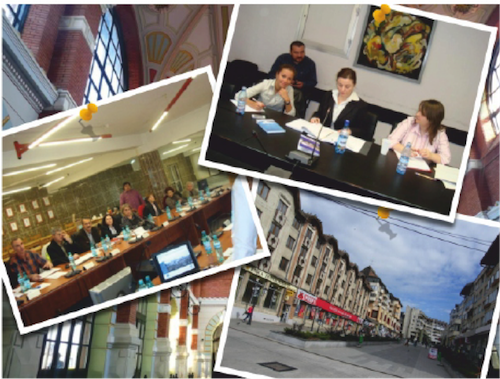
Hitting the road
With little input available within the city, there was a need to turn to the outside world to find a way forward for the Suceava’s Local Support Group. An important step forward was taken during the summer 2011. A delegation of Suceava ULSG members participated in the URBACT Summer University, organised by the Programme in Krakow, where partner cities from all over Europe gathered to share experience and good practices for participatory and integrated approaches to urban development. The Summer University was a milestone event for the Suceava’s delegates: they learned about effective ways of setting up and running local partnerships, discussing issues and building consensus in policy-making. Breaking hierarchy by working in small mixed groups, incorporating visual elements and role games, discussing actual cases among peers: none of this had ever been experienced in Suceava before.
It also became clear that all cities in the project shared similar concerns; and that instead of working as a loose consortium, they all belonged to a bigger community of interest that could find effective solutions working together. The experience in the Summer University prompted a facilitator-led seminar in Suceava to share useful tools and techniques with the rest of the community. “Here in Suceava, we are not in the position to reinvent the wheel. URBACT is about capitalising on the experience and achievements of other cities so as to enhance their urban policies”, says Dan. For Suceava, the Summer University was a breakthrough moment that revealed the added-value of the URBACT Method. Sharing concerns and solutions across ULSGs from other partner cities and also from other networks proved to be an effective exercise for increasing the legitimacy of the project vis-à-vis the stakeholders.
Following the URBACT University, a new dynamic emerged in Suceava’s local support group. Many issues were still to be explored and divergent views had to be considered. For instance, the transportation company wanted to discuss how and when electric buses would be introduced. The car dealer was concerned about purchasing EVs without having potential buyers and needed reassurance that the municipality was creating the necessary infrastructure to charge it. EVUE made a decisive contribution for Suceava through transnational exchange activities, and more especially: an expert seminar organised in Suceava, where EVUE partners shared their good practices; the study visit to the city of Frankfurt, to see on the ground how charging points operate and take part in a showcase of EV technology; and finally the training sessions where experts from Norway, the leading country on EVs, shared their 20-year long experience with ULSG members and cleared doubts and concerns. For Suceava, their experience was a concrete example showing that introducing technology for EVs is feasible, that it is good for the environment and that it has the potential to create new growth and job opportunities.
The USLG reached a consensus on introducing EVs and started drafting the local action plan as part of the local support group activities. Radu Pentiuc, professor at the Electrical Engineering Department of the Suceava University and member of the ULSG, is enthusiastic about the method developed for the production of the action plan. “Our Local Action Plan was truly a community product. Each contribution, idea and proposal by any stakeholder was treated equally and if agreed upon, included in the action plan. However, it would not have been possible without the transnational input made available by URBACT, in particular by partners from Nordic countries with their long experience in the field.”
The ULSG raising awareness
Suceava's ULSG realised a series of dissemination events targeted at secondary school pupils. Their aim was to sensibilise the citizens of the future about the opportunities which EVs will bring, both in terms of environmental protection and of increased competitiveness and work opportunities.The events were also meant to help tackle some "bad habits" and to increase the use of public transportation.
The Local Action Plan was finalised towards the end of 2012 and immediately approved by the city council of Suceava, which was considered as a first concrete positive outcome of the network. It was the first time that a participatory approach was incorporated in policy-making in Suceava, and it was the first initiative on EVs in any Romanian municipality. Through the EVUE experience, Suceava became the forerunner in electrical vehicles in Romania – and the national pioneer in driving change in a participatory way. The positive results of EVUE should encourage Romanian cities to undertake the same journey. The Romanian Council for Municipalities and the Ministry of Development have established close contacts with Suceava in this perspective.
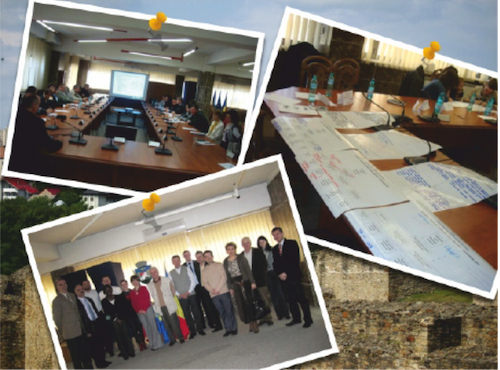
URBACT, a catalyst for change
URBACT networks are about developing sustainable solutions to major urban challenges; their implementation does not fall in the programme’s remits. Funding for implementation of these solutions is a responsibility of each partner city. Yet networking can also be a great support in this regard.. Already through the action-planning exercise within the local support group, URBACT appears as a driver for change. Dan, EVUE coordinator for Suceava, underlines: “In my long experience working for municipalities, we have produced hundreds of documents, programming schemes, proposals often to little avail. Our URBACT local action plan is about concrete actions: creating charging points, introducing subsidies for those buying EVs, buying EVs to replace fossil-fuelled buses; and so on”.
Dan, Sinziana and Radu agree that the success of the project relies on both the hands-on approach of the action-planning process, and the way it was developed, as a joint exercise of the Local Support Group. Cooperation among members of the Local Support Group is extending beyond the duration of the project, to cover the actual implementation of the action plan. The local University has planned on expanding its courses on Electric Engineering to make room for EVs technology.
What is more, the URBACT Method is already spilling over to other activities carried out by the municipality. Elements of the URBACT local support group have been incorporated in the plans to renovate the city centre. Discussions were held in each neighbourhood of the city with selected stakeholders. The URBACT Method proved to be flexible enough to be adapted to local needs and used to address different policy challenges.
URBACT has showed that fostering a collaborative working culture enhances the value of a project and the relation with the citizens. But there is a third added-value: participation in URBACT projects is an excellent breeding ground for future participation in international projects.
Taking part in EVUE has laid the foundations for implementing the actions indicated in the LAP. Funds for purchasing the first EVs are being made available through Swiss-Romanian cooperation; the municipality hopes to be able to draw from EU structural funds in the medium term.
For Suceava, this URBACT cooperation has paved the way for further action and transnational activities: Suceava joined some EVUE partners in the second round of FreVUE, an FP-7 project aimed at showing that EVs operating the “last mile” freight movements in urban centres can offer significant and achievable decarbonisation of the European transport system.
All in all, Suceava is definitely gearing up for the future.
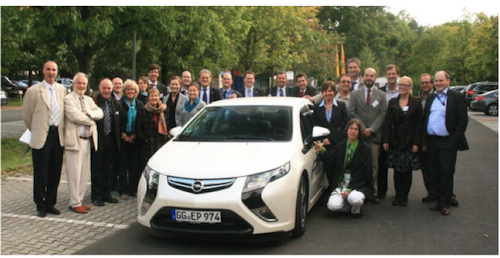
Read more :
URBACT Local Support Groups - URBACT website
![]() Download Evue Suceava LOCAL ACTION PLAN (5.55 MB)- Project document
Download Evue Suceava LOCAL ACTION PLAN (5.55 MB)- Project document
EVUE minisite - URBACT website
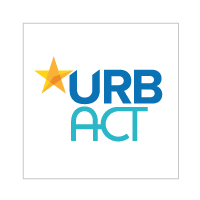 Submitted by URBACT on
Submitted by URBACT on
